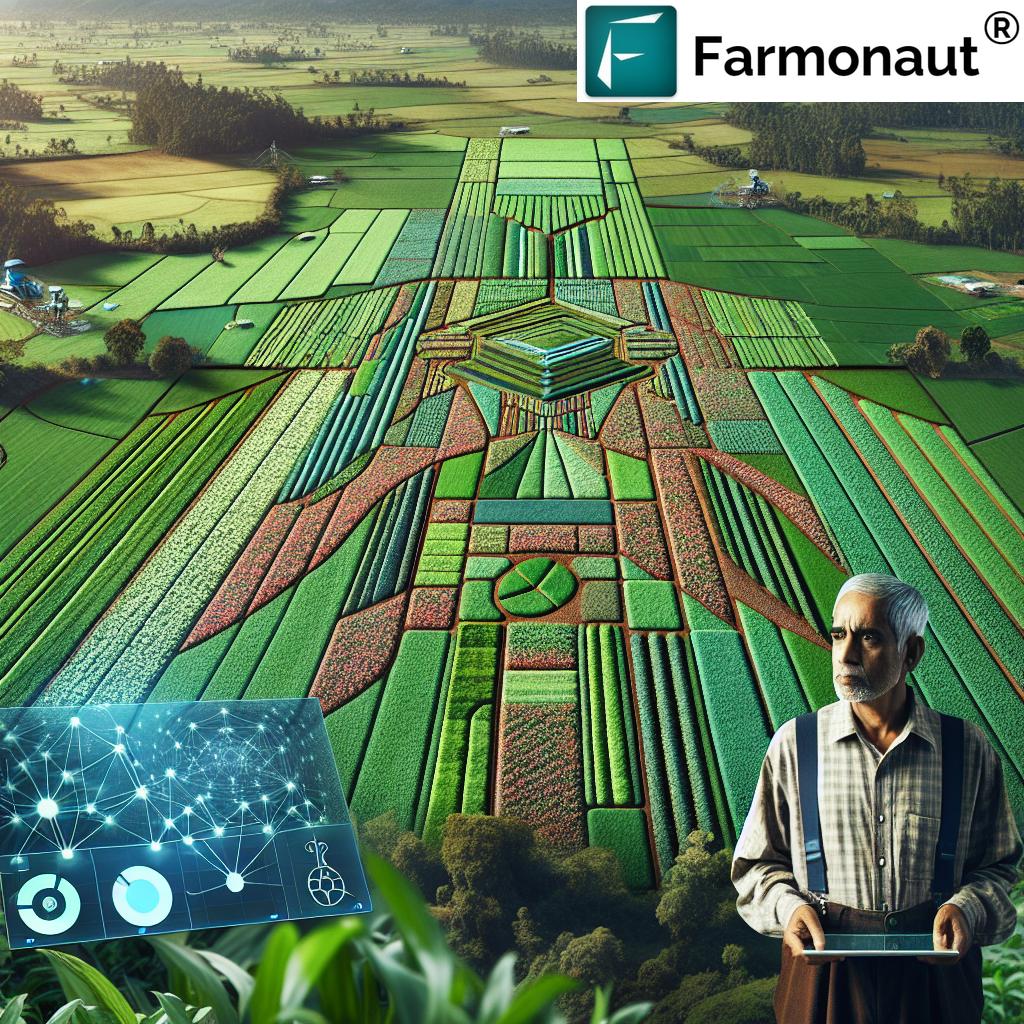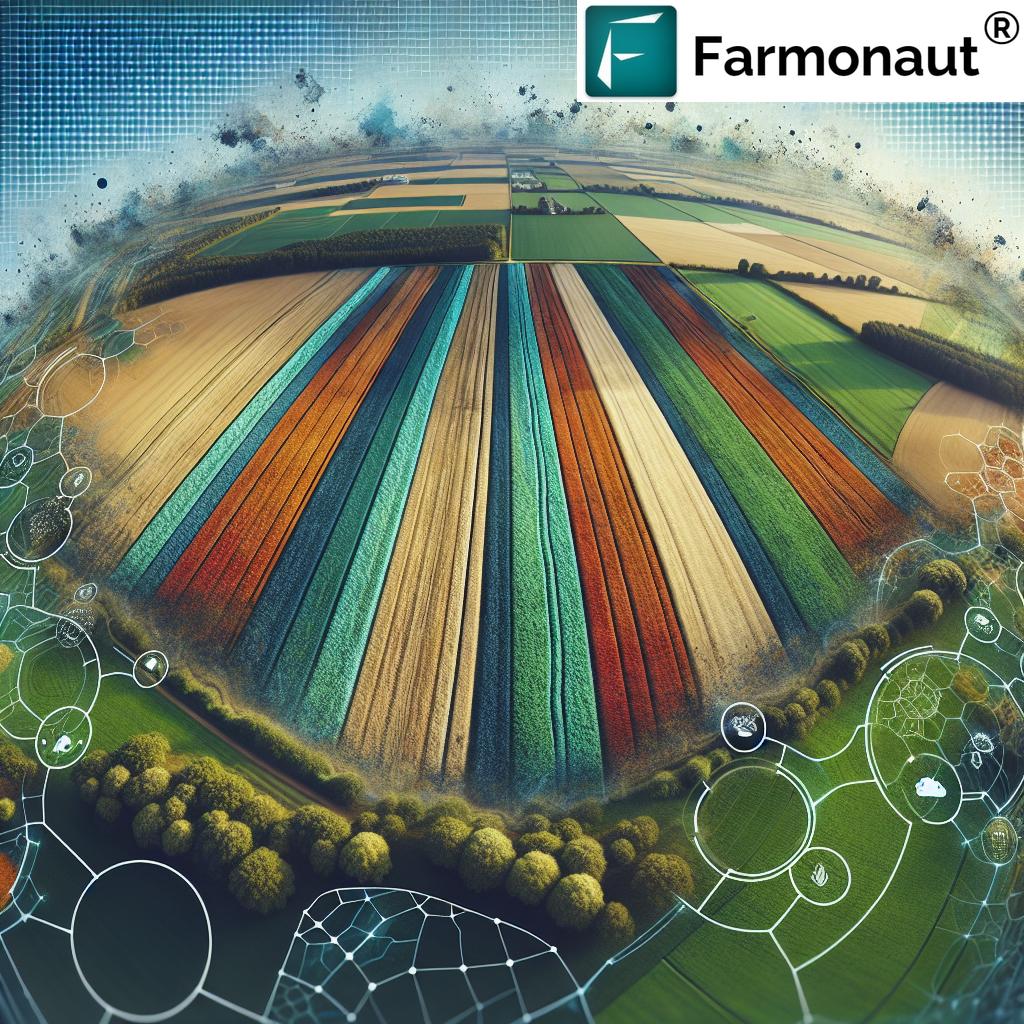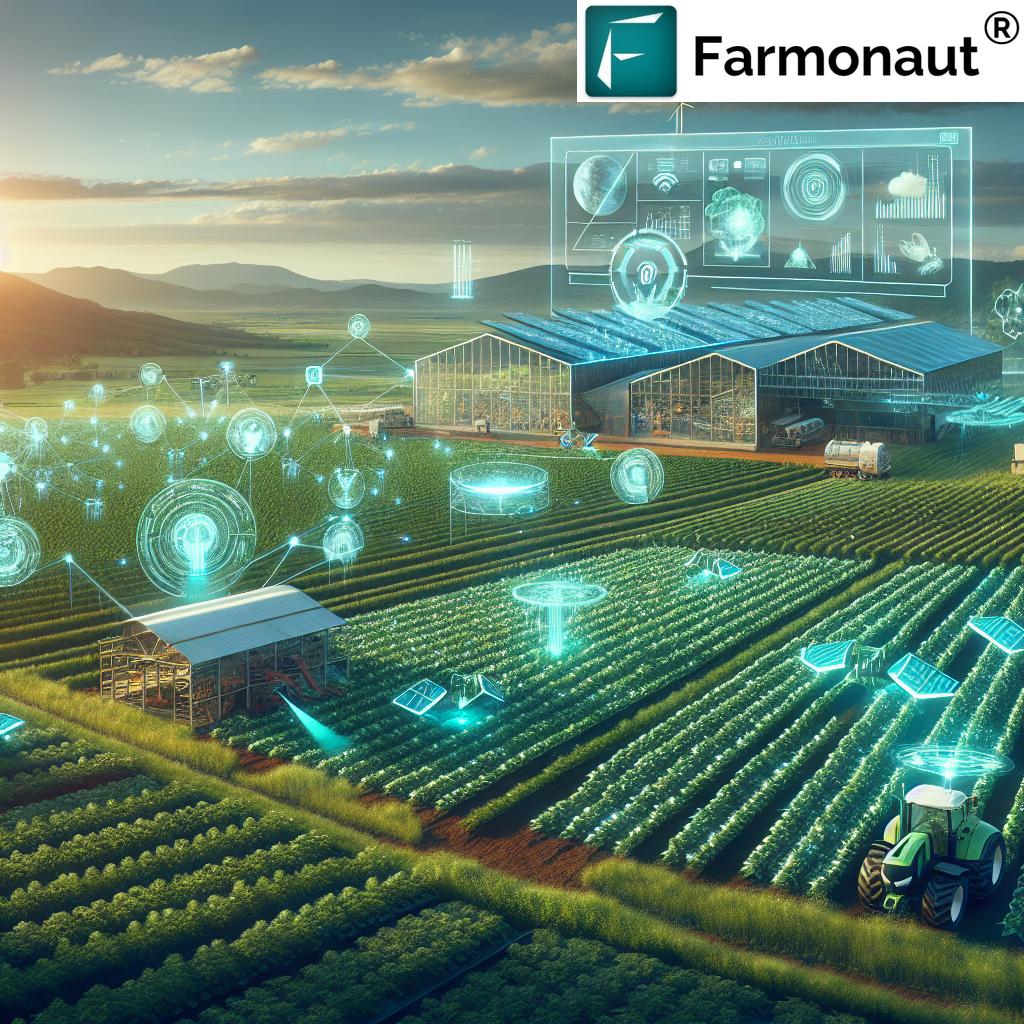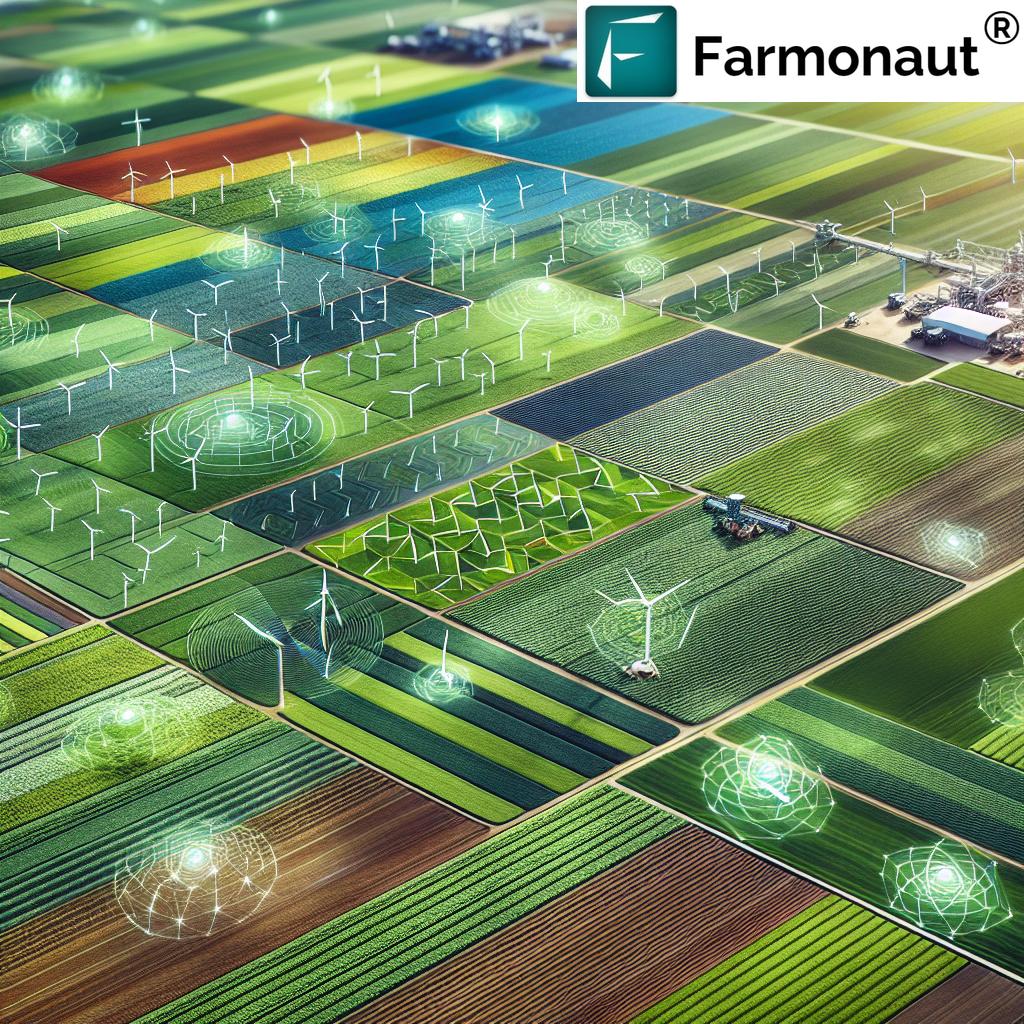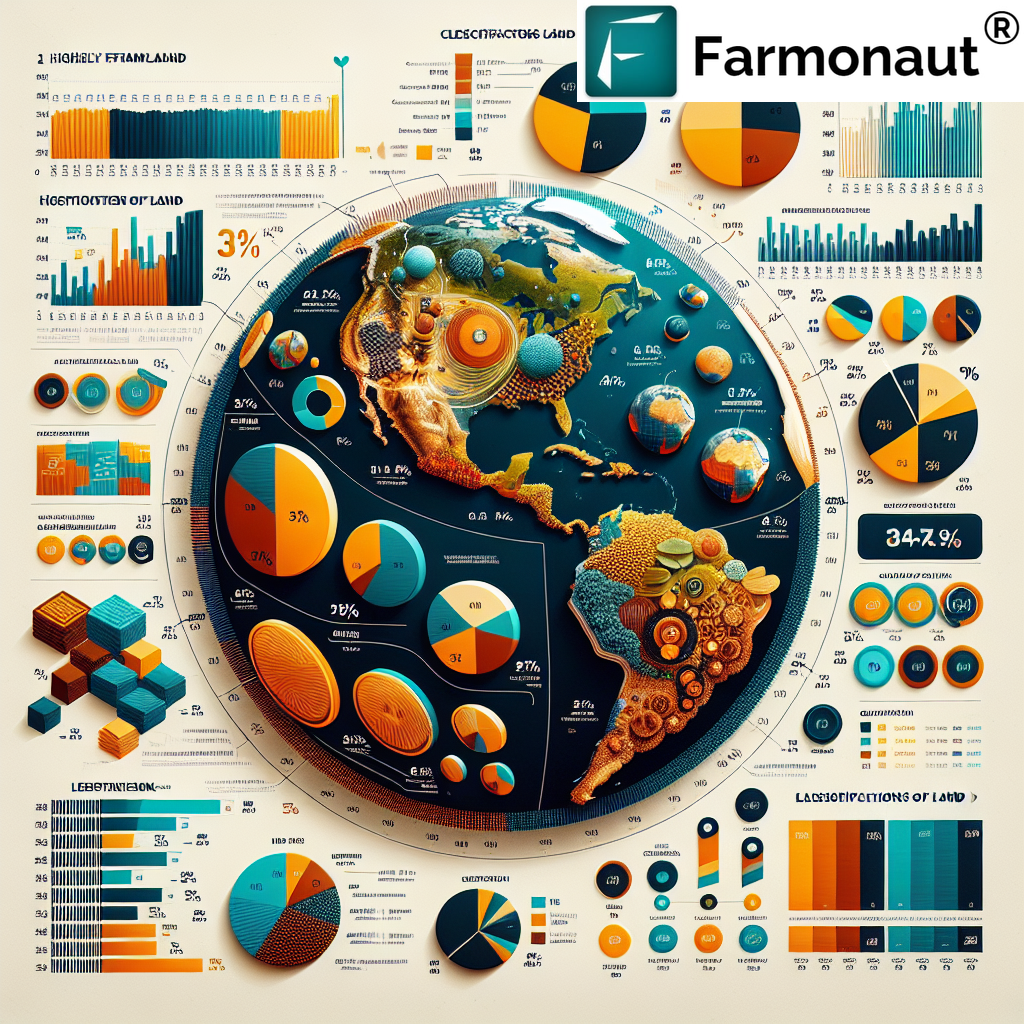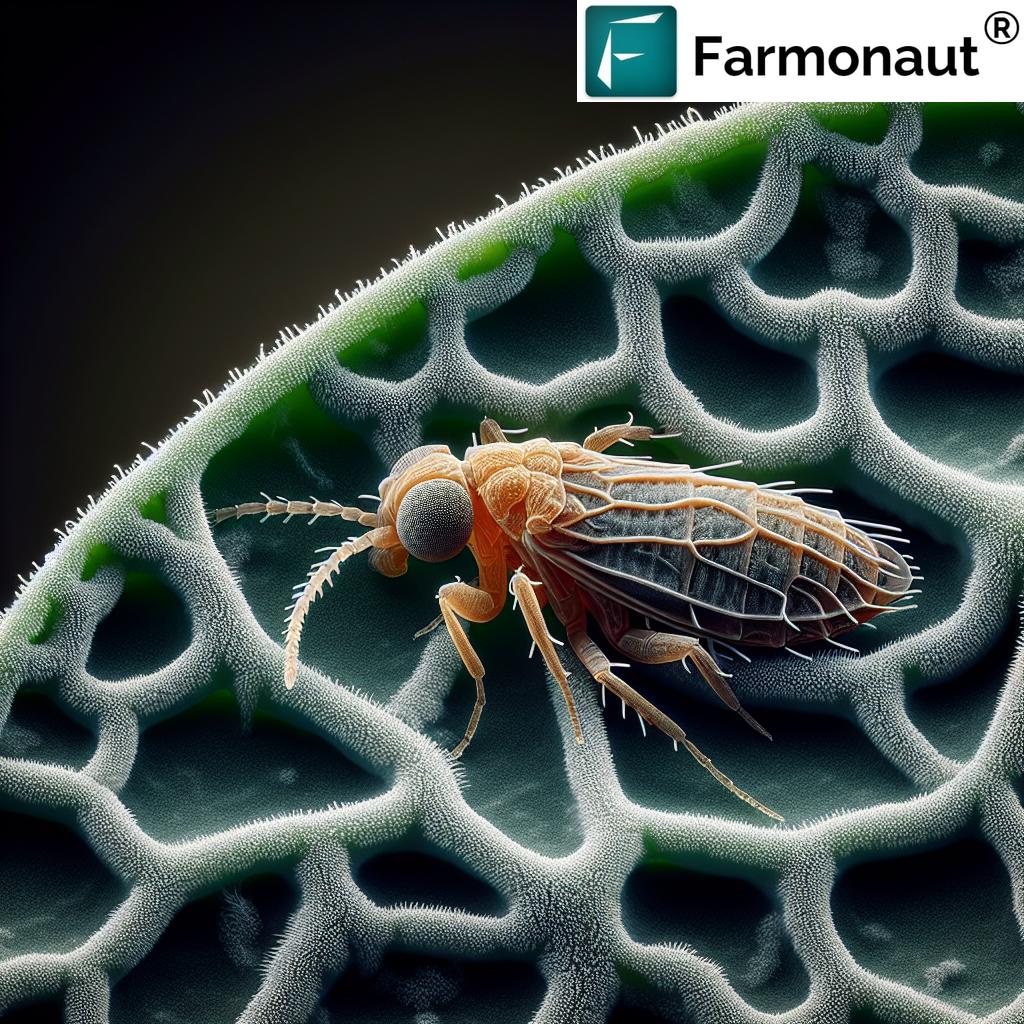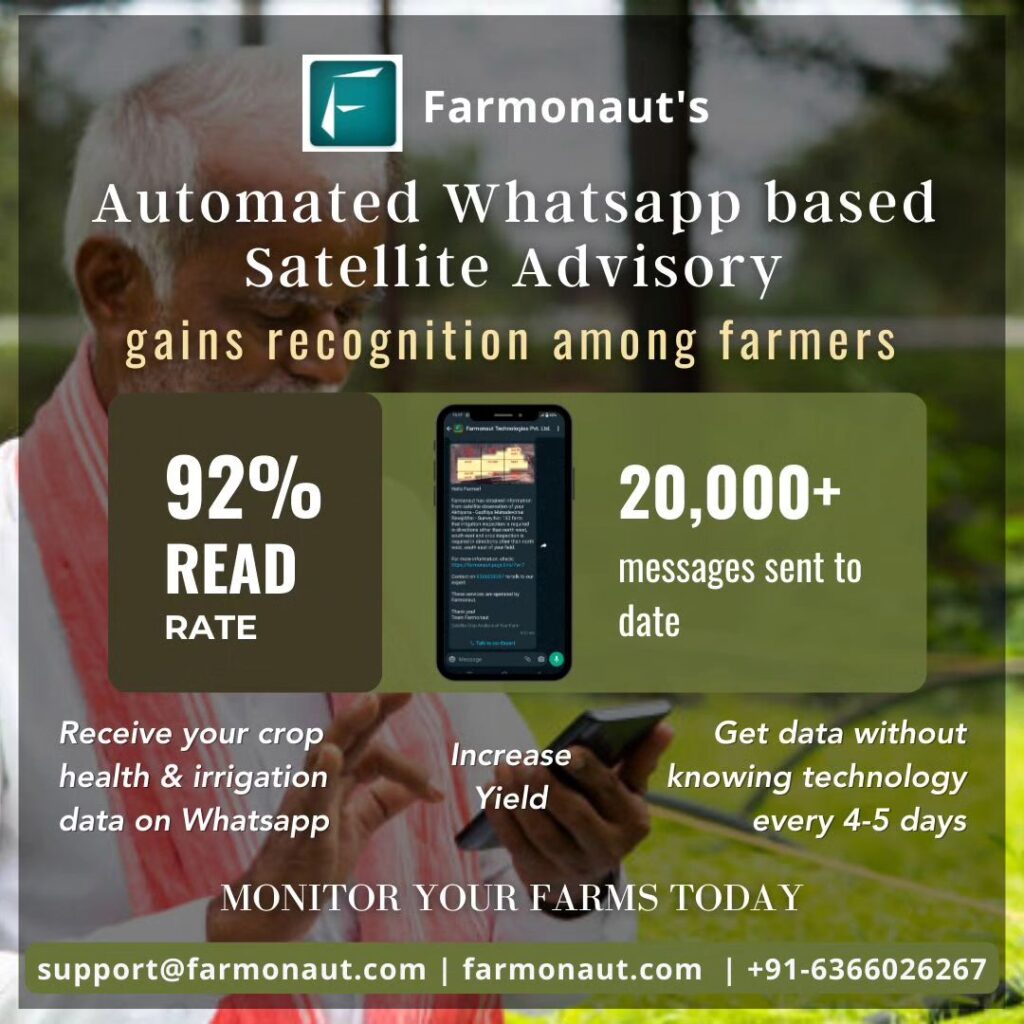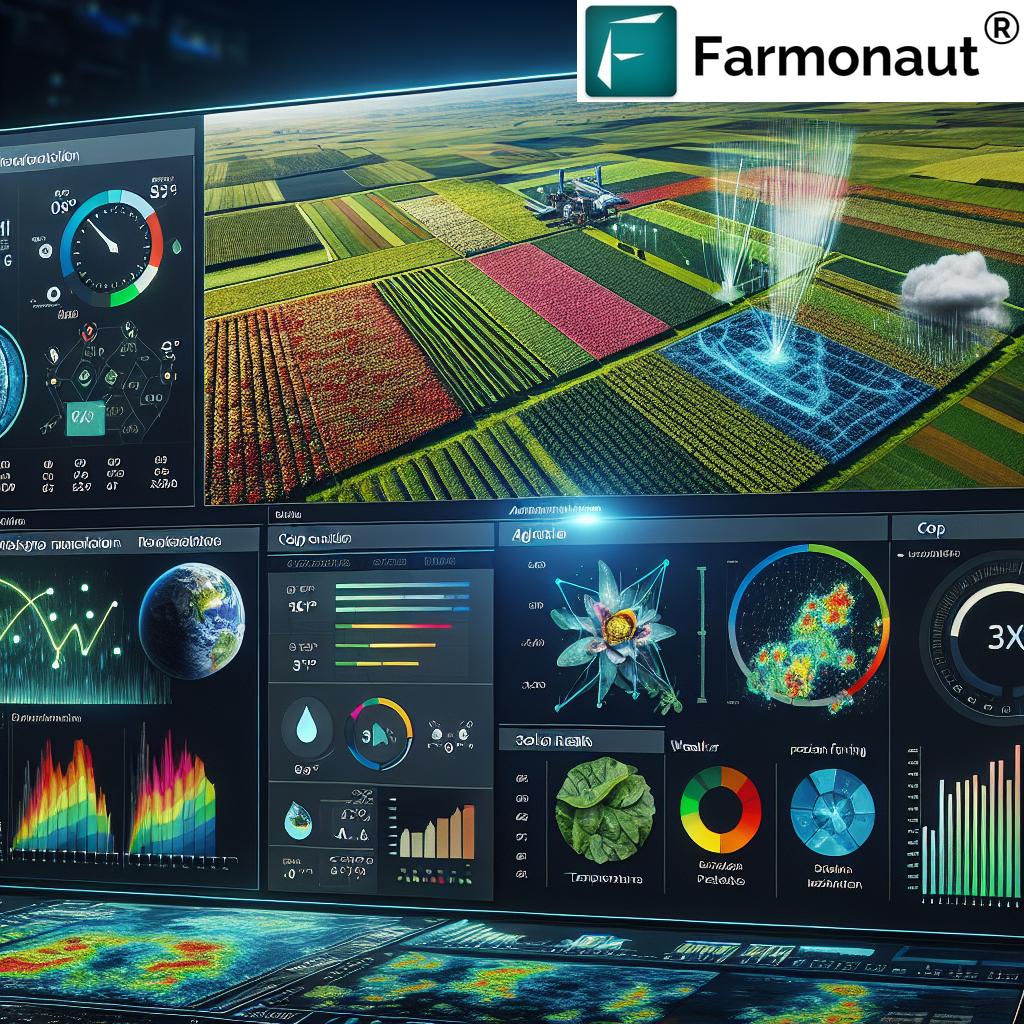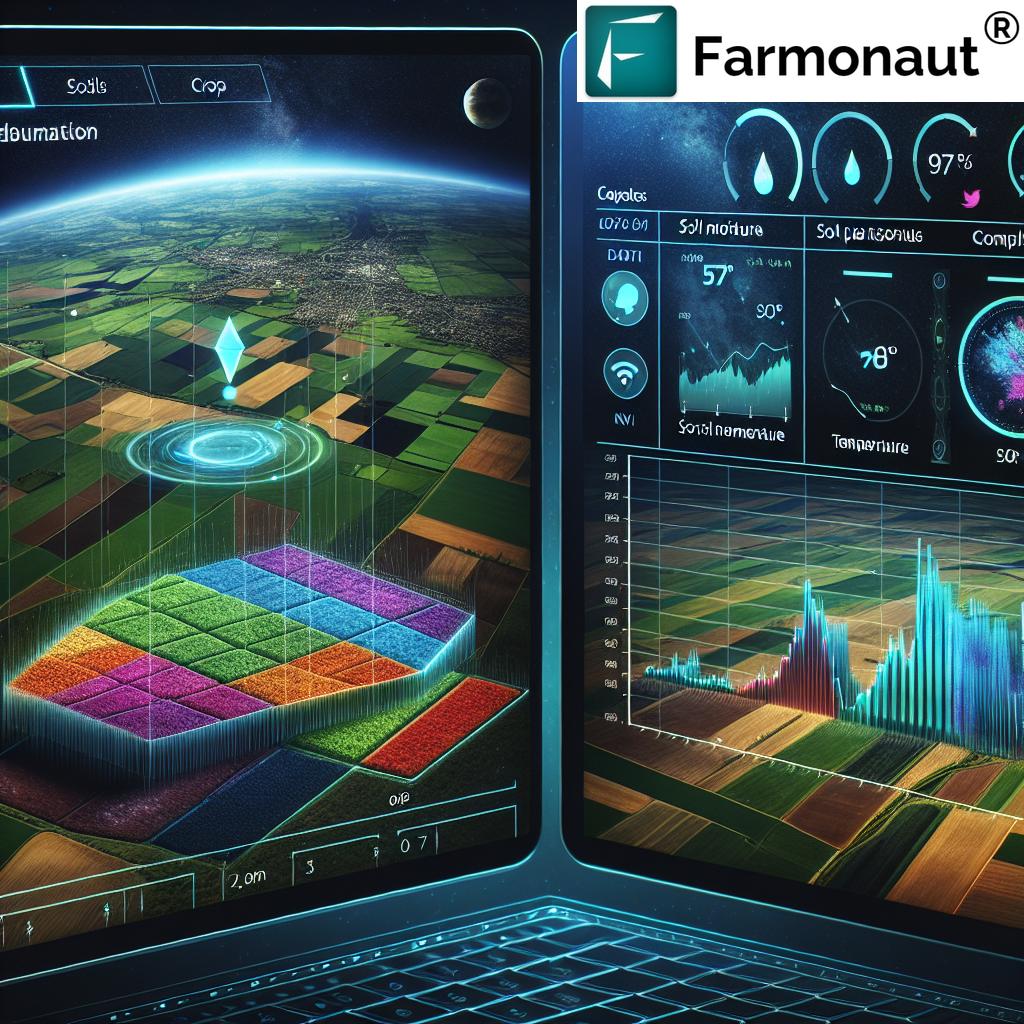Revolutionizing Smallholder Farming: How Farmonaut’s AgTech Solutions Boost Sustainable Productivity
“Precision farming solutions have increased crop yields by up to 30% for smallholder farmers adopting these technologies.”
In the ever-evolving landscape of global agriculture, we are witnessing a remarkable transformation that promises to revolutionize the way smallholder farmers operate. At the heart of this agricultural renaissance lies the innovative realm of sustainable agriculture technology, or AgTech. These cutting-edge solutions are not just changing the face of farming; they’re reshaping the future of food security and agricultural sustainability on a global scale.
As we delve into the world of AgTech and its impact on smallholder farming, we’ll explore how companies like Farmonaut are at the forefront of this revolution, offering advanced satellite-based farm management solutions that are making precision agriculture accessible and affordable for farmers worldwide.
The AgTech Revolution: Empowering Smallholder Farmers
The agricultural sector is undergoing a profound transformation, driven by the need to feed a growing global population while facing challenges such as climate change, resource scarcity, and economic pressures. Smallholder farmers, who produce a significant portion of the world’s food, are at the center of this revolution. AgTech solutions are emerging as powerful tools to enhance their productivity, sustainability, and resilience.
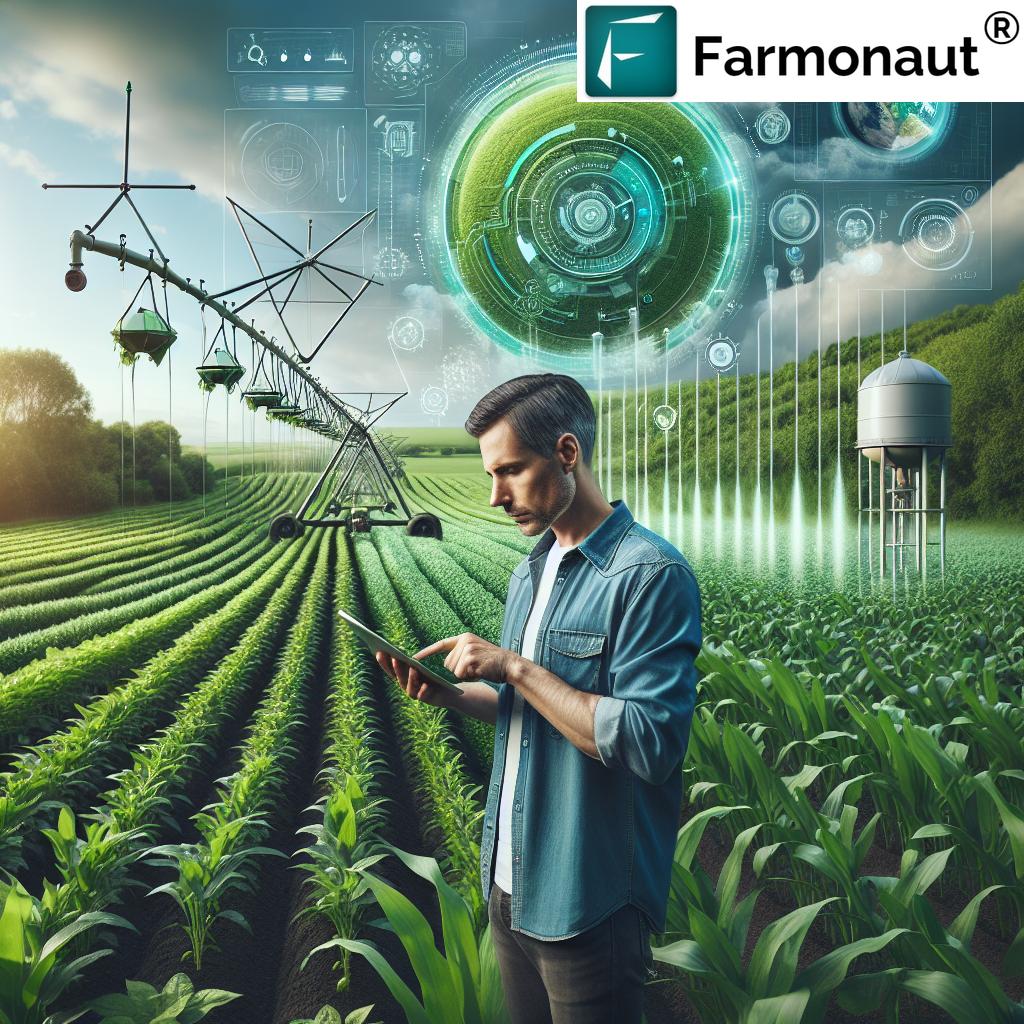
Key AgTech Innovations Transforming Smallholder Farming
- Precision Farming Solutions: Utilizing GPS, sensors, and data analytics to optimize resource use and increase yields.
- Smart Irrigation Systems: Employing IoT devices and AI to manage water resources efficiently.
- Crop Disease Management Technology: Leveraging AI and image recognition to detect and prevent crop diseases early.
- Digital Agriculture Platforms: Providing farmers with access to market information, weather forecasts, and agricultural advice.
These innovations are not just futuristic concepts; they’re real solutions that are already making a significant impact on the ground. For instance, Farmonaut’s satellite-based crop health monitoring system is helping farmers make informed decisions about irrigation, fertilizer usage, and pest management, ultimately optimizing crop yields and reducing resource wastage.
The Role of Sustainable Agriculture Technology in Boosting Productivity
Sustainable agriculture technology is at the core of the AgTech revolution, offering solutions that not only increase productivity but also promote environmental stewardship. These technologies are designed to help farmers produce more with less, reducing the environmental footprint of agriculture while improving yields and profitability.
Key Benefits of Sustainable AgTech Solutions:
- Increased crop yields through optimized resource use
- Reduced environmental impact through precision application of inputs
- Enhanced resilience to climate change and extreme weather events
- Improved soil health and biodiversity
- Better water management and conservation
Farmonaut’s GIS and remote sensing technologies exemplify these benefits, offering farmers powerful tools for land management and crop analytics. By providing real-time insights into crop health, soil moisture levels, and other critical metrics, Farmonaut empowers farmers to make data-driven decisions that optimize their operations and promote sustainability.
Overcoming Barriers: Making AgTech Accessible to Smallholder Farmers
While the potential of AgTech is immense, its adoption among smallholder farmers faces several challenges. These include limited access to technology, lack of digital literacy, and financial constraints. However, innovative companies and strategic investments are working to overcome these barriers.
Strategies for Increasing AgTech Adoption:
- Developing affordable and user-friendly technologies
- Providing training and support to farmers
- Creating partnerships between tech companies, NGOs, and governments
- Implementing innovative financing models
Farmonaut is leading the charge in making AgTech accessible by offering its advanced solutions through user-friendly android, iOS, and web applications. This approach ensures that even farmers with limited technical expertise can leverage the power of satellite-based farm management.
Explore Farmonaut’s solutions:
The Power of Precision Farming Solutions
Precision farming solutions are revolutionizing agriculture by enabling farmers to make data-driven decisions. These technologies allow for the precise application of inputs such as water, fertilizers, and pesticides, leading to increased efficiency and reduced environmental impact.
Key Components of Precision Farming:
- GPS-guided machinery
- Remote sensing technologies
- Soil and crop sensors
- Farm management software
Farmonaut’s precision farming solutions leverage satellite imagery and AI to provide farmers with actionable insights. This includes real-time crop health monitoring, AI-based advisory systems, and resource management tools, all designed to optimize farm productivity and sustainability.
“Agtech investments in sustainable agriculture have grown by 250% in the last five years, reaching $30 billion globally.”
Digital Agriculture Platforms: Bridging the Information Gap
Digital agriculture platforms are playing a crucial role in connecting smallholder farmers with vital information and services. These platforms serve as a one-stop-shop for farmers, providing access to weather forecasts, market prices, agricultural advice, and even financial services.
Benefits of Digital Agriculture Platforms:
- Improved decision-making through access to real-time information
- Enhanced market access and price transparency
- Access to expert advice and best practices
- Facilitation of financial services such as loans and insurance
Farmonaut’s platform goes beyond traditional digital agriculture offerings by integrating advanced features such as blockchain-based traceability and AI-driven advisory systems. This comprehensive approach ensures that farmers have all the tools they need to succeed in an increasingly complex agricultural landscape.
Smart Irrigation Systems: Optimizing Water Use in Agriculture
Water scarcity is a growing concern in many parts of the world, making efficient irrigation a critical component of sustainable agriculture. Smart irrigation systems use a combination of sensors, weather data, and AI to optimize water use, ensuring that crops receive exactly what they need, when they need it.
Key Features of Smart Irrigation Systems:
- Soil moisture sensors
- Weather-based irrigation scheduling
- Remote monitoring and control
- Leak detection and prevention
Farmonaut’s satellite-based monitoring system complements smart irrigation technologies by providing farmers with comprehensive insights into soil moisture levels across their fields. This information, combined with AI-driven recommendations, enables farmers to make informed decisions about when and where to irrigate, leading to significant water savings and improved crop health.
Crop Disease Management Technology: Protecting Yields and Livelihoods
Crop diseases can devastate harvests and farmer livelihoods. Advanced crop disease management technologies are emerging as powerful tools in the fight against these threats. These solutions use a combination of AI, image recognition, and sensor data to detect diseases early and provide targeted treatment recommendations.
Advantages of Advanced Crop Disease Management:
- Early detection of diseases before they spread
- Reduced use of pesticides through targeted applications
- Improved crop yields and quality
- Lower environmental impact
Farmonaut’s platform contributes to effective crop disease management by providing real-time monitoring of crop health. The system can detect anomalies in vegetation health that may indicate the presence of diseases, allowing farmers to take swift action to protect their crops.
The Future of AgTech: Trends and Opportunities
The AgTech sector is rapidly evolving, with new innovations emerging regularly. As we look to the future, several trends are shaping the landscape of agricultural technology and creating exciting opportunities for entrepreneurs and investors.
Emerging AgTech Trends:
- AI and machine learning for predictive analytics
- Blockchain for supply chain transparency
- Vertical farming and controlled environment agriculture
- Gene editing for crop resilience and nutrition
- Robotics and automation in farming operations
Farmonaut is at the forefront of these trends, continuously innovating to bring cutting-edge solutions to farmers. The company’s focus on integrating AI, blockchain, and satellite technology positions it well to address the evolving needs of the agricultural sector.
AgTech Entrepreneurship: Driving Innovation in Agriculture
The growing AgTech sector is creating numerous opportunities for entrepreneurs to develop innovative solutions that address the challenges faced by smallholder farmers. From farm management software to IoT devices for precision agriculture, the possibilities are vast.
Key Areas for AgTech Entrepreneurship:
- Data analytics and decision support tools
- Sustainable input technologies (e.g., bio-fertilizers, precision spraying)
- Farm-to-consumer platforms
- Fintech solutions for agriculture
Farmonaut exemplifies the spirit of AgTech entrepreneurship, having developed a comprehensive platform that addresses multiple aspects of modern farming. The company’s success demonstrates the potential for innovative startups to make a significant impact in the agricultural sector.
Investing in AgTech: Opportunities for Growth and Impact
The AgTech sector is attracting significant investment as more investors recognize its potential for both financial returns and positive social impact. Equity investments in promising AgTech firms are on the rise, driven by the sector’s growth prospects and the urgent need for sustainable agricultural solutions.
Investment Opportunities in AgTech:
- Early-stage startups developing innovative farming technologies
- Scale-up companies expanding their reach and impact
- AgTech-focused venture capital funds
- Public-private partnerships for agricultural innovation
While we don’t discuss specific investment opportunities, Farmonaut’s growth trajectory and innovative solutions highlight the potential for AgTech companies to create value for investors while contributing to sustainable agriculture.
The Role of GIS and Remote Sensing in Modern Agriculture
Geographic Information Systems (GIS) and remote sensing technologies are playing an increasingly crucial role in modern agriculture. These tools provide farmers with unprecedented insights into their land and crops, enabling more precise and efficient farming practices.
Applications of GIS and Remote Sensing in Agriculture:
- Crop mapping and yield estimation
- Soil health assessment
- Pest and disease monitoring
- Water resource management
- Climate change impact analysis
Farmonaut’s GIS and remote sensing technologies are at the core of its offerings, providing farmers with powerful tools for land management and crop analytics. By leveraging satellite imagery and advanced data analysis, Farmonaut enables farmers to make informed decisions that optimize their operations and promote sustainability.
Explore Farmonaut’s API solutions: Farmonaut API
For developers: API Developer Docs
AgTech Solutions Impact Comparison
| AgTech Solution | Estimated Productivity Increase (%) | Key Benefits | Adoption Challenges |
|---|---|---|---|
| Smart Irrigation Systems | 20-30% | Water conservation, improved crop health | Initial cost, technical knowledge required |
| Crop Disease Management Tech | 15-25% | Early disease detection, reduced pesticide use | Data interpretation, connectivity issues |
| Precision Farming Tools | 10-20% | Optimized resource use, increased yields | Equipment cost, learning curve |
| Digital Agriculture Platforms | 5-15% | Improved decision-making, market access | Digital literacy, data privacy concerns |
| Farmonaut’s GIS and Remote Sensing | 15-25% | Comprehensive farm insights, data-driven decisions | Internet connectivity, initial adoption resistance |
Conclusion: The Path Forward for Sustainable Smallholder Farming
The AgTech revolution is transforming smallholder farming, offering unprecedented opportunities for increased productivity, sustainability, and resilience. As we’ve explored, solutions ranging from precision farming tools to digital agriculture platforms are making a significant impact on the ground.
Farmonaut stands at the forefront of this revolution, providing innovative satellite-based farm management solutions that make precision agriculture accessible and affordable for farmers worldwide. By leveraging advanced technologies such as AI, blockchain, and remote sensing, Farmonaut is empowering farmers to make data-driven decisions that optimize their operations and promote sustainable practices.
As we look to the future, the continued development and adoption of AgTech solutions will be crucial in addressing the global challenges of food security, climate change, and resource scarcity. By supporting innovation, investment, and education in the AgTech sector, we can create a more sustainable and productive future for smallholder farmers and the global agricultural system as a whole.
FAQ Section
- Q: What is AgTech and how does it benefit smallholder farmers?
A: AgTech, or Agricultural Technology, refers to the use of technology in agriculture to improve efficiency, productivity, and sustainability. It benefits smallholder farmers by providing tools for better decision-making, optimizing resource use, and increasing crop yields. - Q: How does Farmonaut’s technology help in sustainable farming?
A: Farmonaut’s satellite-based technology provides real-time insights into crop health, soil moisture, and other critical factors. This enables farmers to make informed decisions about irrigation, fertilizer use, and pest management, leading to more sustainable farming practices. - Q: What are some key challenges in adopting AgTech for smallholder farmers?
A: Key challenges include initial costs, lack of technical knowledge, limited access to technology, and sometimes resistance to change. However, companies like Farmonaut are working to make AgTech more accessible and user-friendly. - Q: How does precision farming contribute to sustainable agriculture?
A: Precision farming allows for the targeted application of inputs like water, fertilizers, and pesticides. This reduces waste, minimizes environmental impact, and optimizes resource use, contributing to more sustainable agricultural practices. - Q: What role does AI play in modern agriculture?
A: AI in agriculture helps in various ways, including predicting weather patterns, detecting crop diseases early, optimizing irrigation, and providing personalized farming advice. Farmonaut’s Jeevn AI advisory system is an example of AI application in agriculture.





